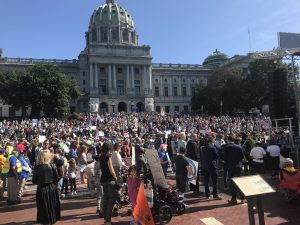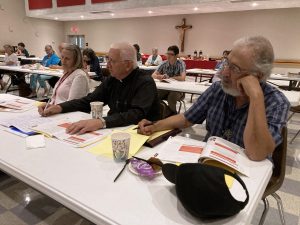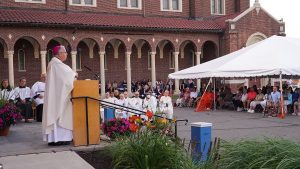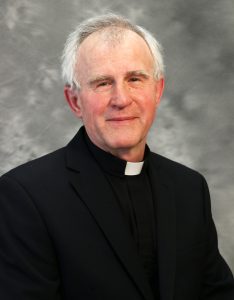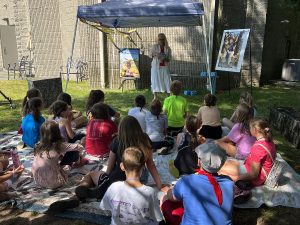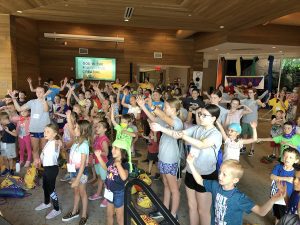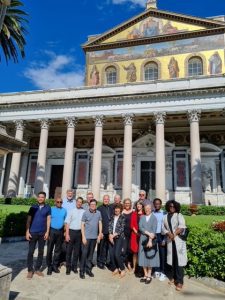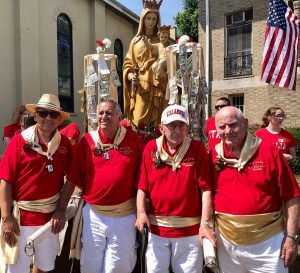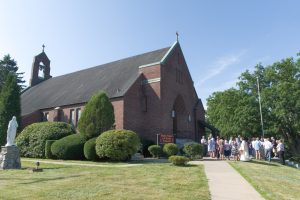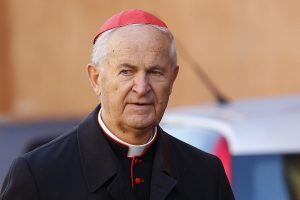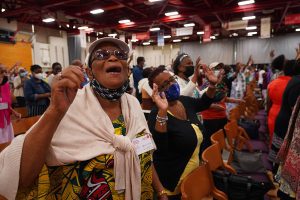
SCRANTON — The University of Scranton was again alive with the sounds of joyful praise as the Holy Spirit consumed nearly one thousand devotees who descended on the Scranton campus during the Aug. 5-7 weekend. That is when the annual summer Catholic Charismatic Renewal Conference of the Diocese of Scranton — a sight not witnessed since 2019 due to the COVID-19 pandemic — took place.
Glory to God and gratitude for being able to once again gather in His Holy Name was palpable for the three-day spiritual pilgrimage, which traditionally attracts fervent faithful from across the country.
Fittingly, the 2022 Charismatic Conference theme — “O magnify the Lord with me and let us exalt His name together’’ — matched the prayerful, jubilant celebration of the masses, and it certainly was not lost on Charismatic Renewal liaison and conference coordinator Karen McLain.
“We were so grateful and excited to have this in-person conference!” McLain exclaimed, stating approximately 900 souls gathered in the Diocese that weekend. “God inhabited the praises of His people and blessed us with His presence in challenging messages from our speakers.”
“All left encouraged to take the message home to their parishes,” she added.
Fellow conference organizer, Brian Hughes, was equally elated.
“It was great seeing so many faces, new as well as familiar ones after being apart for three years,” he said. “It was a great spiritual reunion, and I’m looking forward for a bigger reunion next year.”
The gathering was nothing less than “amazing” for Cindy Cox, who proclaimed this year’s much-anticipated conference was truly “a blessing to so many people!”
Longtime Catholic Charismatic Renewal participant Cathy Best continued to be filled with a sense of joy and love throughout the weekend.
“Volunteer workers and people I didn’t know, who traveled here from out of state, greeted me with happy smiles,” Best commented, adding how the Holy Spirit touched each and every person in attendance. “I had walked in tired but the lively music ministry soon got me off my feet, giving me energy to praise.”
She concluded, “The (conference) teachings opened my mind to know Jesus and how He responds to our prayers and praise,” more than she ever realized before.
The weekend’s many inspiring speakers and uplifting music came to an all-encompassing celebratory conclusion at the conference closing Mass on Sunday, with Bishop Joseph C. Bambera as principal celebrant and homilist.
Bishop Bambera opened his homily by referring to his recent visit to Rome for the Vatican’s International Catholic-Pentecostal Dialogue.
“What struck me more than anything else during my first experience leading the Dialogue was that while the differences between the Catholic Church and the Pentecostal movement are not insignificant in terms of our theological and ecclesiological understandings, our belief in the Eucharist and the sacramental life, and our style of worship, at the heart of our faith is a shared appreciation for and openness to the Spirit of God,” the bishop noted.
He added further, “It’s also fair to say…that Catholics and Pentecostals share a deep appreciation for the Charismatic Renewal that has touched our lives so deeply and that we celebrate this weekend.”
One attendee from New York City commented at the end of the conference, “Let us continue to spread the message we heard at Scranton. Victory is our praise! God inhabits the praises of His people, so let us go forth into this day with a praise on our lips and a song in our heart…making joyful melodies unto the Lord.”

